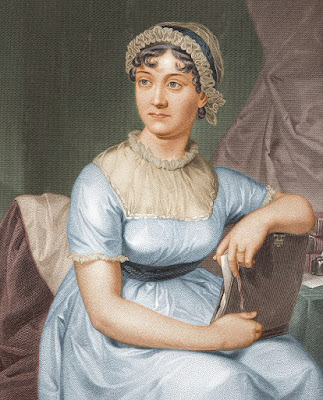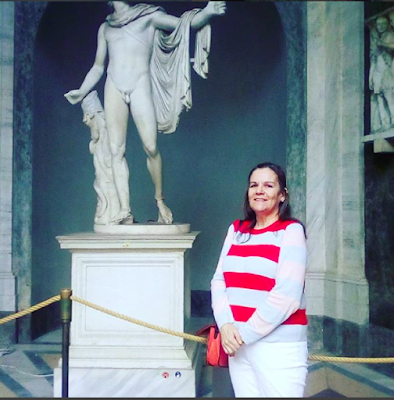Eighteen takeaways from my Eighteenth-Century Studies program at King’s College London
Because I frequently confuse Americans when I tell them my master's is in Eighteenth-Century Studies from King's College London, I realized I needed to explain what I learned and what the degree means:
1) The program is done in tandem with the British Museum. Students learn about everything from engraving to antiquarianism, the history of Colonialism to the study of coins. There are opportunities to learn at museums such as the National Portrait Gallery, Foundling Museum and John Soane Museum, although I only went to the first two. Lessons at King's may include a book such as Evelina by Frances Burney one week and handouts on "Low Lifes" in Covent Garden the next;
2. The curriculum has a "core course" and optional classes. Students choose between what are called modules, in Philosophy, Comparative Literature, Music, History, French and German, as well as English literature. The bulk of my units were in English (120 of 180), including my dissertation;
3.We went on a few cool field trips, including to the Old Royal Navy College, where we walked up steep scaffolding to observe the Painted Ceiling at close range as well as to the Enchanted Princesses exhibit inside Kensington Palace. I was so new in the program that I had not yet understood the implications of these princesses' lives. They were the daughters of George III and Queen Charlotte;
4. We read a lot. Reading material included books from the school's Maughan library as well as online chapters and other material. I spent a lot of time at Maughan printing out my Philosophy readings alone;
5. We wrote one essay at the end of each semester, a dissertation at year's end. The essays were marked on a scale of 50+, with 50-60 Pass, 60-70 essentially a "B", and over 70 what is called "Distinction" (like an American A);
6. We enjoyed fascinating speakers, from an expert on poet-visionary artist William Blake and his engravings, done in a special back room at the British Museum, to an expert on Diderot and his Encyclopédie, who spoke to us in another hideaway at the BM;
7. In our optional modules, we learned with students outside our cohort. There were about 16 students in my 18th c. group. I had one of these students in each of my optional modules - Philosophy, Comp Lit, and the History of Sci, Tech and Medicine;
8. Everyone on the M.A. at King's is assigned a personal tutor. It is important to preface the term with "personal" because in the UK, tutors are the equivalent of professors here. A professor in the British system is a loftier title. My personal tutor, Mark. was delightful and instilled confidence. An American, the connection really helped when I was far from my home country. I remember his high-fiving me (figuratively) when I got a 72 on my "Mansfield Park" essay;
9. Some of my favorite books were Dialogues by Hume, Evelina by Frances Burney, Britons : Forging the Nation 1707-1837 by Linda Colley, and Public and Private Science: The King George III Collection, by Alan Q.Morton and Jane A. Weiss;
10. My vocabulary expanded greatly while at King's: pamphleteer, parallax, popinjay, temporize, liminal, ignominy, penumbra, epistemological, trope and sedition were just a few of my new words. I kept them in a little notebook I still have! When my laptop and notes were stolen, I started a new list. I am a little embarrassed that I was unclear on the meaning of sedition and hadn't really heard trope, but that's okay!;
11. Because I had to come back to America at Christmastime, I used that opportunity to conduct research in Washington, D.C. as well. I had been living in Falls Church, Virginia prior to my move to London and my lease wasn't up yet. Therefore, I made the most of it, poring over documents of Jefferson's at the Library of Congress, doing research on the dandy pickpocket of the 18th century at LOC, and handling rare treasures at Folger Shakespeare;
12. One of my tutors, Niall, did not allow laptops or electronic devices of any sort in class. This was an opportunity for me to better connect with the material. By taking notes on paper, I memorized and better understood my texts as well as his lessons. He also called on us in class even if we did not raise our hand. I still remember responding to a question, feeling proud and learning from the experience;
13. Because London is a rich source of material in itself, if one is studying history or English literature, chances are the guy next to you on the tube or in the pub is a sounding board for your lessons. He or she has also probably read about dandy pickpockets or low lifes! When I had first arrived, I went for lunch at a pub across from the Houses of Parliament. A nice couple chatted with me. The lady told me she had just gotten her master's, that it's "a lot of reading" but clearly, a great achievement;
14. I wrote my dissertation on an aspect of the scientific instruments of George III. I spent the summer of 2018 pounding the pavement, racing from the BL to the BM one day, Windsor Castle to Foyle Special Collections at King's the next. I also conducted research at the Royal Society, Royal Astronomical Society and Royal Geographical Society. Many of these required an application process. In the case of Windsor, I needed an introduction and to be approved. A history pofessor at King's is a leader on the Georgian Papers Programme, in which the records of George III and others in the Royal family are being digitized;
15. Students have the opportunity to attend talks, lectures and myriad events. I didn't have much free time, but I joined a classmate at the British Library's Knowledge Centre to see David Crystal, an expert on language.
16. The university was founded by Royal Charter by King George IV in 1829, as part of the University of London system. It was one of just two original colleges in the system. Now, nearly 200 years later, is not unusual for a member of the Royal Family to speak or appear somewhere at the university, even if it is impossible to find out about in advance. Prince Harry spoke while I was there, but I hadn't heard about it in advance. After graduatimg, Queen Elizabeth and the Duchess of Cambridge made an appearance.
17. Students are given ample opportunity to prepare for their theses. I attended a session presented by Emrys Jones, co-convener of the program, in which students discussed their dissertation ideas and got feedback from random students who attended the session. We also read a fabulous book that sometimes engendered jokes because the late author is smoking a pipe on the cover, looking very un-P.C. by modern standards! The book is "How to Write a Thesis by Umberto Eco". Humorous aside: When people talked about "Ecco" I thought of this book. However, a trove of eighteenth-century materials are in an online archive called Eighteenth-Century Collections Online! There was another "ecco" convenor Clare Brant told me about, but I forget what it is;
18. Finally, the value of earning a master's administered by the English Department at King's College London is like playing baseball in Wrigley Field. English began across the Pond. American students will change the way they hear and speak the language. I started saying "to-mah-to", for example, because it just made sense.
The Painted Hall, where I stand in the first image, has appeared in many films and television shows. It is featured midway through the Cary Grant-Ingrid Bergman 1958 classic "Indiscreet" and many others.










Comments
Post a Comment